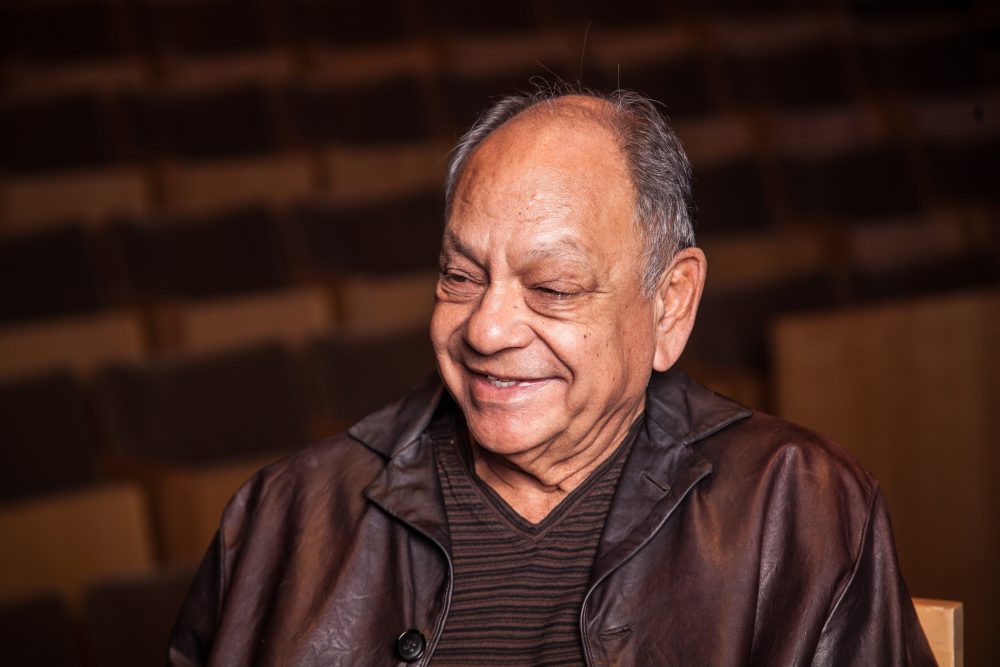
Photo by Jake Fabricius.
Cheech Marin is an actor, director, art collector, and bon vivant. A native Angeleno, he did breakout work in comic partnership with Tommy Chong, before going on to a prolific film career. Before taking part in a Zócalo/Getty “Pacific Standard Time: LA/LA” panel discussion titled “Is L.A. Really Part of Latin America?” at The Getty Center, he spoke in the green room about how to sound like an animated car, discovering Chicano painters, and walking the beat with his policeman father.
Your dad was an LAPD cop. What was his beat?
They changed their beats all the time, to get assigned to different stations. But I remember the first one, it was downtown, Chinatown, Little Tokyo, Olvera Street, Skid Row. I remember walking the beat with him several times, because we’d go to dinner in Chinatown, and everybody knew him.
Was there a particular place you’d go?
I don’t remember the name, but it had these little [fortune telling] fountains that you’d throw coins into, and it’d give you messages, ‘You will live happy!’ or ‘You will die soon!’ It depends on where they landed.
In your film career you’ve played a padre, a rat, a car—which role would you like to play next? What would be your dream role?
Wow! Dream role would be a guy who was totally forgotten, and then remembered at the end. Like an old blues guy.
You’ve done a lot of voice roles in animated films. After starting with the script, how do you then develop a voice that can carry an entire part?
For me, it’s a matter of volume, deciding how big to go. And I don’t think you can get too much of that, because you’re competing with this drawn character, and it can’t be too over-the-top. It’s a matter of size and proportion. When you’re in the process of it, you’ll find the volume and the proportion at which you’re supposed to do it.
Marijuana is legal now. Did you ever think that would happen?
Well, I always lived under the assumption that it was legal!
Growing up, did you hear Spanish, English, or Spanglish spoken in your house?
Both. My parents were born here, so they were raised with Spanish but spoke English. They spoke Spanish when they didn’t want me to understand. I was raised with English and had to learn Spanish later. And when the family got together it was a mix, it went back and forth all the time.
You collect a wide variety of art, and you’ve also focused a lot on work by Chicano artists. How’d that come about?
The lack in my knowledge was contemporary art. I knew up to modern art; I knew contemporary art names, but I didn’t actually know [works]. So I started going to galleries on the Westside of L.A., and that’s when I started discovering these Chicano painters. And I knew what good painting was, because I’d seen it all my life. So I was like, ‘These guys are good, man! These guys are great. How come they’re not getting shelf space?’ And I bought a bunch of paintings right at once. I was looking for something green, to go over the couch. [Laughs] And then I saw these paintings and started buying them, and then the inveterate collector in me came charging out.
With all the discussion right now about immigration, is there a story from your own life that you’d like our leaders to hear about what immigrants have brought to this country?
Immigrants have brought everything to this country. I mean, I don’t care if they’re Mexican or Salvadoran or South American or Irish or Dutch. We are an immigrant nation. And to try to cut that off once you’ve gotten yours—which is what’s happening—is to not understand how this country was built or how it works.
Do you have a favorite Latin American city?
It’s not a city, but I like Costa Rica. I go there a lot. Because it’s ocean, it’s jungle, and the people are relaxed. Pura vida is the line. I started going down to Quepos and then I’ve been there a bunch of times. And then it was like, Man, this is jungle-jungle! And there’s shit that comes out of the jungle, man! One time, me and my buddy were staying up in this house, and we were walking down to the beach and smoking a joint, and this thing crawls out of the jungle, like, ‘What in the f^*k is that?’ It looked like an orangutan, kind of, sort of—between an orangutan and an anteater. And it was big! We looked at him and he looked at us. What it was, it was a sloth that crawled out of there. And then there’s snakes!
And those electric-blue butterflies.
Yeah. You find down there, it’s the small things, those little terciopelos [vipers], those little snakes! And if you get bit, there’s some kind of antidote made out of horse urine. And you can die from that, too!



